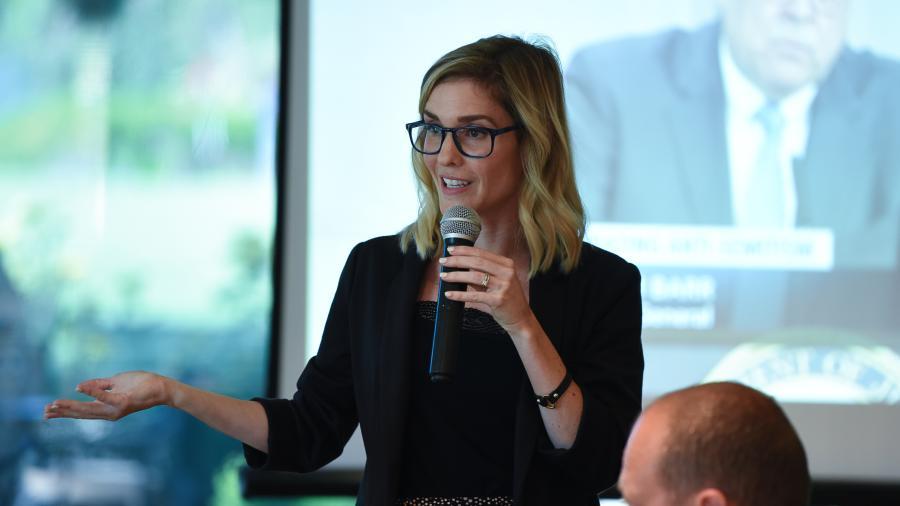Westmont Magazine A Christian Finds Her Calling Fighting Antisemitism

Holly Huffnagle ’09, a committed Christian, became the U.S. director for combating antisemitism at the American Jewish Committee (AJC) this year. Her appointment created some controversy. On Twitter, Howard Dean wrote, “AJC gets no points for this,” and Christians “don’t have much of a reputation for anything but hate these days.” AJC responded to the former Democratic National Committee head by tweeting that Holly “has dedicated her career to fighting antisemitism” and demanding an apology.
“Howard Dean called attention to what I’m doing,” Holly says. “Maybe I should thank him as I received incredible support from people in my organization.”
As a Christian fighting antisemitism, she has encountered mixed reactions. “Some in the Jewish community ask about my motive for doing this work, and I understand that question,” she says. “My Christianity had never before played an open role in my work. On the other hand, some non-Jews assume I’m Jewish because I’m fighting antisemitism. Why do we assume antisemitism is a problem for Jews to solve? I think the onus is on the non-Jew to fight against it—not on the victim. I try to use my non-Jewish identity to give a broader perspective on the issue.”
Based in Washington, D.C., Holly leads AJC’s efforts to combat antisemitism in the United States. She first joined the organization as the assistant director of AJC Los Angeles. Her work involves engaging with members of Congress, something she’s done virtually so far. In fact, she has focused primarily on issues of digital antisemitism, including Zoom- bombing, when antisemites crash Zoom meetings and post hateful images and language. Like everything else during the pandemic, hate has moved online. The latest reiteration of antisemitism is a conspiracy theory blaming Jews for creating COVID-19.
Holly first felt called to this work as a history major at Westmont. During Europe Semester, she visited concentration camps in Germany, Poland and the Czech Republic, encountering the reality of the Holocaust for the first time and confronting how European Christians had treated the Jewish people. “I asked myself, ‘How could it happen? What led to it? What does it mean for me as a Christian, and what am I called to do? How can I bring about reconciliation?’” Those questions have defined her career.
She began studying about World War II and the Holocaust at Westmont and wrote her capstone history paper on “Messianism Revisited: Polish Catholics’ Memories of World War II Suffering.” She later returned to Westmont to teach a class, The Politics of Prejudice and Antisemitism: Religion, Israel, and U.S. Foreign Policy. In fall 2017, she co-led Europe Semester with history professor Rick Pointer and his wife, Barb, teaching courses on the Holocaust and contemporary European challenges. She knew the Pointers well as they led the program she participated in as a student.
After graduating from Westmont in 2009, Holly got a job at the Holocaust Museum documenting the testimony of Holocaust survivors. Some of them talked about how much they had in common with their Muslim neighbors in Poland. “I didn’t know there were ethnic Muslims living in Poland, and I decided to look into them,” she says.
To expand her understanding of Jewish-Muslim relationships in Poland, she earned a master’s degree at Georgetown University in global, international and comparative history, completing a thesis titled “Peaceful Coexistence? Jewish and Muslim Neighbors on the Eve of the Holocaust.” She took classes in Polish at the University of Pittsburgh and lived in Poland. “I learned that Muslims and Jews lived together peacefully before the Holocaust,” Holly says. “Muslims even rescued Jews. This untold story has a lot to offer to our world today.”
Holly next worked for the U.S. Department of State for three years, first as an analyst evaluating the quality and effectiveness of exchange programs through the Bureau of Educational and Cultural Affairs. She then spent two years advising the special envoy to monitor and combat antisemitism (SEAS) on policies to lower levels of global antisemitism, provide security for viable Jewish communities, engage civil society and invest in effective education.
Holly realizes how well the liberal arts curriculum equipped her with the many skills she has needed in her work. “I was best in math and chemistry in high school, and I’m so glad my Westmont professors saw potential in my writing and research, which led me to what I do now,” she says. “They invested in me academically and spiritually and encouraged me to grow.”
Holly discovered her calling at Westmont and met her husband, Jason Huffnagle ’09, there. Raised in Alaska, Jason also majored in history. He spent six years working on Capitol Hill for Senator Lisa Murkowski, a Republican from his home state. He has held positions as a writer, designer and content manager and now develops proposals for Environ- mental Systems Research Institute (ESRI), a software company that creates mapping and spatial analytics technology. Their software is being used worldwide to map COVID-19.
Holly and Jason belong to a group of five Westmont couples who get together periodically for a supper club. “All my best friends come from Westmont,” Holly says. “Relationships are always more important than careers. These friends continue to support me and my work to combat antisemitism. Westmont has given me this constant support.”
Photo by Richard Cassel